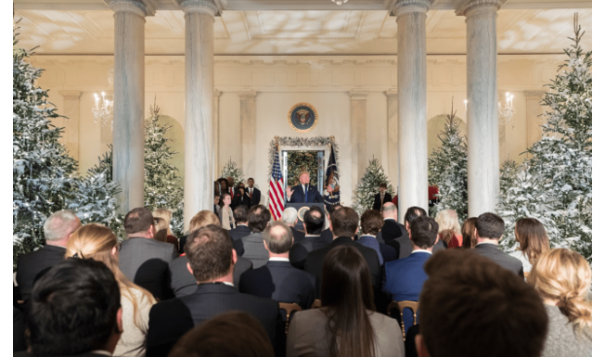
Mark Trahant / Trahant Reports
The first year of the Trump era has been challenging: The administration and the Congress sought to repeal the Affordable Care Act and radically redesign one of the nation’s best public health insurance programs, Medicaid. That plan failed. And I’ll come back to that point shortly.
But first: Congress did move forward with its other agenda item, to rewrite the tax code and reduce the amount of federal income taxes that most pay. And the two key words here are income tax. That’s important because most people pay more in payroll taxes than income taxes. The Joint Committee on Taxation looked at the numbers a couple of years ago and found that 80 million tax filers that earn $40,000 or less pay no federal income tax and many even get cash refunds. But we pay $121 billion in Social Security and Medicare payroll taxes. Even those families who make between $40,000 and $75,000-pay three times as much in payroll tax as in federal income tax—nearly $190 billion of the former and just $64 billion of the latter. The total income for a household has to exceed $100,000 more before income tax is a bigger cost than payroll taxes. Bottom line: Wealthy people get a tax cut.
The big winner in the tax bill, however, is business. The new law sharply drops what corporations and small business pay in federal income taxes. The Tax Policy Center calculates that savings at nearly three times as much for business owners in 2019 as for people who whose primary source of income is wages or salaries. The Tax Policy Center found that all households would get an average 2019 tax cut of about 1.6 percent of after-tax income (roughly $1,200). Those who make most of their income from wages would get a tax cut of about 1.5 percent of after-tax income, or about $1,200. But owners of pass-through businesses such as partnerships and sole proprietorships would get an average tax cut of 4.3 percent of their after-tax income (about $4,300).
It’s important to note that corporate taxes have gone up in recent years, but are not at historically high levels (as shown in this Tax Policy Center chart.) During the 1950s corporate taxes were 6 percent of the Gross Domestic Product.

One way Congress looks at business taxes is to account for “pass through” taxes. So if you earn money as, say, a freelancer. Then you can deduct expenses on another form. This process could be useful to a few people in Indian Country. If you do work that could be considered a “business” (and make enough to pay income taxes) make sure that you are set up as a business because you will pay less tax under this new law.
So lots of people — and especially companies — will pay less in federal taxes. And the federal treasury will have a lot less funding as a result.
“The tax bill will provide a bonanza to the most well-off Americans and profitable corporations, even as it leads millions of Americans to lose health coverage and ultimately raises taxes on many low- and middle-income Americans,” writes Robert Greenstein of the Center for Budget and Policy Priorities. “And, faced with criticism that the tax bill will swell budget deficits, President Trump and House Republican leaders have made clear that one of their top priorities for 2018 will be to use the fast-track budget “reconciliation” process — the same process they used to pass the tax bill — to cut assistance programs that aid millions of struggling families, to try again to repeal the Affordable Care Act (ACA) and cut Medicaid, or both.”
The process of reconciliation means that budget cuts next year could pass the Senate with only 50 votes — all Republicans. That’s awful. But the good news is that even might be a huge hurdle for Republican leaders. The problem is that the Republican majority is not sure what it wants. Some members want more money for the military and are willing to work with Democrats (who want money for domestic programs to make that so). Others want stark budget cuts; sequester times X. Others just want to find a deal of some kind, something that governs the country.
We already know these divisions are deep because the Republican-only majority has been unable to pass a budget for 2018 (which started October 1). The government is running on a temporary spending bill that expires Jan. 19. Right now the House is working off a funding level that would significantly increase defense spending and slight reduce domestic programs. The Senate is basically working off last year’s budget.
That’s all well and good for now but remember the pressure will increase to balance the budget as the cost of the tax legislation is calculated. As the National Congress of American Indians said: “The current tax reform legislation amounts to little more than a $1.5 trillion increase in the federal deficit over the next ten years. This deficit increase will inevitably create pressure to cut federal programs and services that are extremely important to tribal communities. Deficit-financed tax cuts that lead to austerity budget cuts would affect all Americans, but would disproportionately impact American Indians and Alaska Natives who rely on federal funding of the trust responsibility as well as social programs.”
Congress is governing at two and three week intervals because there are not enough votes to pass a real budget. And that’s not a good sign going forward because the budget only gets more complicated next year because of other issues that Congress has been avoiding.
Happy New Year.
Mark Trahant is the Charles R. Johnson Endowed Professor of Journalism at the University of North Dakota. He is an independent journalist and a member of The Shoshone-Bannock Tribes. On Twitter @TrahantReports
Reposting or reprinting this column? Please do so. Just credit: Mark Trahant / TrahantReports.com #IndigenousNewsWire #NativeVote18
Trahant Reports is on iTunes or Soundcloud. Download here.
